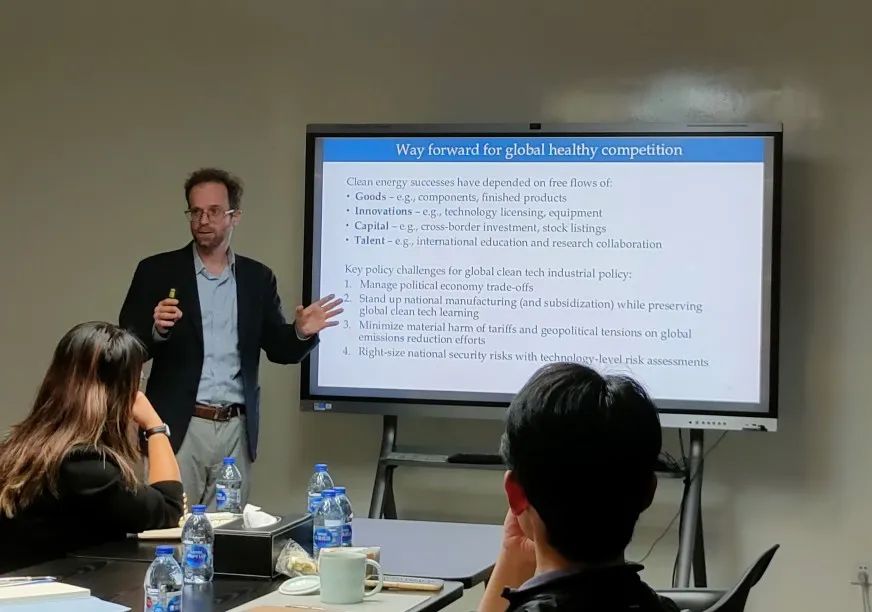作者:WU Siying 发布时间:2024-12-25 22:30:41 来源:Fudan University+收藏本文
美国加州大学圣地亚哥分校全球政策与战略学院以及机械与航空工程系助理教授、能源转型实验室主任迈克尔·戴维森(Michael Davidson)于10月访问复旦大学,在复旦发展研究院从事访学工作。近日,他接受复旦大学融媒体中心采访,分享了他在访问期间的研究内容,探讨了能源和气候变化问题,以及中国所做的工作。能源方面,他提及清洁能源成本降低趋势、中国大规模部署可再生能源情况、中国新兴电力市场特征及与他国差异等内容;在气候变化方面,他肯定了自《巴黎协定》后形势有所改善且正朝着正确方向前进,但也指出仍面临来自地缘政治和监管方面的诸多挑战,强调应关注实际变化以及保持沟通交流的重要性。他特别提及了复旦发展研究院的复旦-加大当代中国研究中心,为促成开放且富有成效的研究交流搭建了平台。尤其在此前举办的两场关于中美关系与气候变化的研讨会中,他与复旦的学者们进行了非常有益的互动,他也希望在访问期间帮助推进第三届研讨会的筹备。以下为采访全文:
Weeks ago, Prof. Michael Davidson, assistant professor at the School of Global Policy and Strategy and the Mechanical and Aerospace Engineering Department and Dean of the Power Transformation Lab at the University of California, San Diego was visiting Fudan University.
Renowned for his research in systems within emerging electricity markets and the engineering implications and institutional conflicts inherent in deploying low-carbon energy at scale, Prof. Davidson has organized several workshops on US-China relations and climate change with Fudan.
How does he view the climate issue and the work China has done in addressing climate change? Let's find out.

Q: What’s your research plan during the Fudan Fellow Program?
Davidson: My first effort is to plan for a third workshop on US-China relations, climate change and clean energy which we’re hoping to hold in San Diego. We’ve held two fruitful workshops before.
In term of research, there are several areas that my lab is exploring. We’re focusing on the geopolitics of clean energy supply chains, energy transitions, and power markets and reliability. For example, we have also done careful lookbacks on China’s power outages to analyze their causes and how to provide low-carbon solutions. We are also planning renewable energy development to find the best locations considering grid and land impacts to build wind and solar farms.
Davidson: My first exposure to China’s energy issues was as a Fulbright Fellow to Tsinghua in 2008. I had just learned some Chinese and was researching small-scale clean energy solutions in the countryside. Since then, I have worked on various topics related to energy and climate. Currently, about two-thirds of my work is related to China’s energy system.
Davidson: One of the biggest trends in clean energy is the drastic reduction in costs. Since 2008, solar panels have become ten times cheaper, batteries about ten times cheaper, and wind energy 7-8 times cheaper, largely driven by Chinese firms and global supply chains. This has made clean energy more economical than coal in many regions of the world.
In China, there has been massive deployment of solar and wind energy, not only due to strong policy support but also because it is now very affordable to build. Last year, China deployed nearly 300 gigawatts of wind and solar, compared to the US pace of 40 gigawatts. This year, China is on track to deploy even more clean energy.
Davidson: The electricity sector needs continued growth in renewable energy to meet targets through 2060. A significant shift is required in how coal is used, moving from a base load to a backup role. Market reforms are crucial to support this change. China, in the midst of a long transition towards electricity markets since 2015, now sells two-thirds of electricity through markets, a dramatic change from just a few percent a decade ago. However, more reforms are needed to create effective price signals and encourage renewable energy. Policies including renewable energy portfolio standards and updated laws are essential to incentivize continued growth in renewables and ensure progress toward 2060 targets.
Davidson: China’s electricity markets are quite extensive. However, they differ from those in Europe and the US in some important ways. In China, most electricity is sold through medium to long-term contracts. They do reduce prices but don’t play well with renewable energy such as solar and wind, which are variable and hard to predict and therefore less compatible with fixed contracts.
To address this, China is piloting spot markets, but they still account for a small portion of electricity transactions.
There’s also a large amount of inter-provincial barriers to electricity trading. Provincial markets rarely interact with each other and negotiations between provinces can introduce inflexibility in the management of spatial variability of renewable energy resources. For example, the west and north have abundant wind and solar power, while demand is concentrated in the east and south. Right now, this mismatch is handled through rigid negotiated contracts. A unified national power market could resolve many of these issues, but setting it up will be challenging.
In comparison, although the US doesn’t have a single national market, it has seven regional power markets covering multiple state areas with coordination across large distances. Europe has a more integrated system with a regionwide electricity market, providing coordination across national borders.
Davidson: The Fudan-UC Center on Contemporary China is a unique partnership that has been going on for many years. We’ve had very open and productive research exchanges through this partnership.Two workshops were held on US-China relations and climate change, one in April 2023 and the other this year in May, and I have had very useful interactions with Fudan scholars through organizing those workshops. I wanted to come to China to push forward the planning for a third workshop on this topic.
Davidson: The really exciting thing that I work on here is discussing future prospects for efforts on climate change. Now we are entering a very difficult period for the relationship as well as for climate change in particular, so these kinds of dialogues are more important than ever in order to maintain some communication even when our governments may stop talking to each other in great substance.
Davidson: The climate change situation has improved since the Paris Agreement in 2015, with clean energy becoming cheaper and countries accelerating their efforts. There is still much to do, however, as deploying technology faces significant challenges, including geopolitical and regulatory hurdles. Future challenges, such as decarbonizing tough sectors, will also intensify. Still, young folks should be heartened, since we’re moving in the right direction. It’s important not to overreact to individual events or statements, but instead focus on tangible, on-the-ground changes.